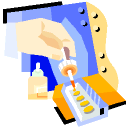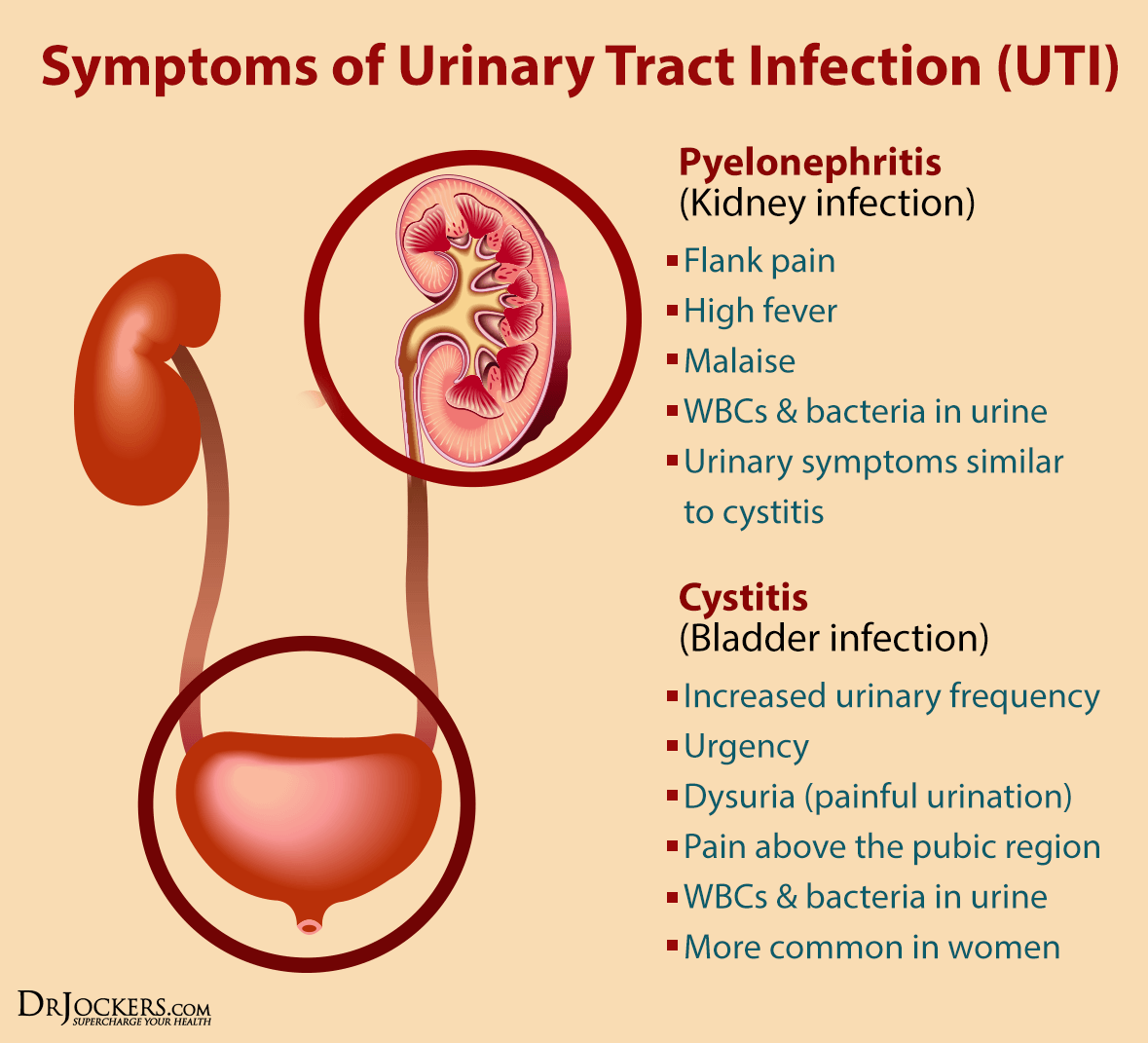What is a Bladder Infection?
 A bladder infection is also called a urinary tract infection (UTI) by most medical people, so if you hear both names, don’t get scared or confused. It’s a bacterial infection that affects any part of the urinary tract. Although urine contains a variety of fluids. salts, and waste products, it normally does not have bacteria in it. When bacteria get into the bladder and multiply in the urine, it causes a urinary tract infection.
A bladder infection is also called a urinary tract infection (UTI) by most medical people, so if you hear both names, don’t get scared or confused. It’s a bacterial infection that affects any part of the urinary tract. Although urine contains a variety of fluids. salts, and waste products, it normally does not have bacteria in it. When bacteria get into the bladder and multiply in the urine, it causes a urinary tract infection.
The most common type of UTI is a bladder infection, which is also often called cystitis. Cystitis literally means an inflammation of the bladder. The other kind of UTI is a kidney infection, which is also known as pyelonephritis. This kind of infection can be serious, but if treated quickly the kidney is most often not damaged permanently.
Although they cause discomfort, urinary tract infections are usually quickly and easily treated, but it’s important that they are treated promptly. You can not get a urinary tract infection from someone else, although females who are just becoming sexually active often get UTIs. Sometimes Chlamydia can also cause a UTI.
UTIs are caused by bacteria, most often by the bacteria that are found inside the intestines and sometimes on the skin around the rectal and vaginal areas. Yes, that means from fecal contamination.
Nearly 85% of UTIs are caused by the bacteria Escherichia coli, or E. coli — for short. When the bacteria pass through the urethra (the narrow urine canal that connects the bladder to the outside), they can get inside the bladder and cause an infection. Some females get urinary tract infections more frequently, this may be because of the differences in the shape and length of the urethra in different people. A female with a shorter urethra may get more UTIs. Most women’s urethras are only about 40mm long. That’s about 1 and a half inches. Males generally get fewer UTIs than females because they have longer urethras. (One advantage to having a penis. They tend to get urethritis).
There are several ways bacteria can get into the urethra. During sexual intercourse, the bacteria in the vaginal area can be pushed into the urethra, which causes irritation in the bladder. In fact, any time the vaginal area is rubbed, bacteria can be pushed into the urethra. You can get a bladder infection from oral sex too. Infections are also common in women who wear tight jeans. (Hey, I just report the facts, sorry girls).
Symptoms
There are a number of symptoms associated with UTIs. Bladder infections are characterized by an urgent desire to empty the bladder. Symptoms include frequent urination, burning or pain during urination (dysuria), bladder spasms and the feeling of having to urinate even though little or no urine actually comes out. In some cases, you may have cloudy, bloody or foul-smelling urine, and maybe a mild fever.
A kidney infection may involve more serious symptoms, including fever, chills, and nausea. There may also be cloudy or bloody urine, abdominal pain and burning, and frequent urination. Most people with kidney infections also experience back pain just above the waist.
If you have any symptoms of a urinary tract infection, you’ll need to go to a health care professional right away. The symptoms won’t go away if you ignore them, they’ll only become worse. The quicker you begin treatment, the less uncomfortable you will be.
Battling UTI Bacteria
 A physician or other health care provider can treat urinary tract infections. The first thing your doctor will do is confirm that you have a UTI by taking a clean-catch urine specimen. At the office or clinic, you’ll be asked to wash your genital area with disposable wipes and then urinate into a sterile (bacteria-free) cup. If an infection is found when the specimen is examined, you’ll be given antibiotics. Since there are many different antibiotics available, the doctor may then use your urine specimen for a urine culture, which is a test to identify the exact type of bacteria causing your infection. It takes about 48 hours to get results from a urine culture, so you may have to switch antibiotics depending on the results.
A physician or other health care provider can treat urinary tract infections. The first thing your doctor will do is confirm that you have a UTI by taking a clean-catch urine specimen. At the office or clinic, you’ll be asked to wash your genital area with disposable wipes and then urinate into a sterile (bacteria-free) cup. If an infection is found when the specimen is examined, you’ll be given antibiotics. Since there are many different antibiotics available, the doctor may then use your urine specimen for a urine culture, which is a test to identify the exact type of bacteria causing your infection. It takes about 48 hours to get results from a urine culture, so you may have to switch antibiotics depending on the results.
Although antibiotics begin fighting the infection right away, they can’t stop all the symptoms right away. If you have a lot of pain, your health care provider may recommend a medication to relieve the pain in your bladder, This medicine will clear up the painful symptoms in about 3 days, although it will usually make you much more comfortable within hours. It’s important to take the antibiotics until the prescription is finished. Many people stop taking the medication when they begin to feel better, but that doesn’t allow the antibiotics to completely kill the bacteria, which increases the risk that the infection will reappear. If you ever develop a rash from an antibiotic or have difficulty breathing, STOP taking it immediately and call the health care provider who prescribed the medication! For some infections, you may only have to take antibiotics for 3 days, but usually you’ll be on medication for 7 to 14 days.
 It’s important to drink lots of water during and after treatment because each time you urinate, the bladder cleanses itself a little bit more. Cranberry juice also has been shown to have positive effects on UTIs. DON’T use the kind of juice that says “Juice Cocktail” on the label. That has too much sugar and is not concentrated enough with cranberries. Make sure the cranberry juice is 100% juice, many brands are now 100% cranberry. Quality cranberry juice produces hippuric acid in the urine which acidifies the urine and prevents bacteria from sticking to the walls of the bladder. If pure cranberry juice is not available, cranberry capsules can be substituted. They can be found in most health food stores. Always take these with a large glass of water.
It’s important to drink lots of water during and after treatment because each time you urinate, the bladder cleanses itself a little bit more. Cranberry juice also has been shown to have positive effects on UTIs. DON’T use the kind of juice that says “Juice Cocktail” on the label. That has too much sugar and is not concentrated enough with cranberries. Make sure the cranberry juice is 100% juice, many brands are now 100% cranberry. Quality cranberry juice produces hippuric acid in the urine which acidifies the urine and prevents bacteria from sticking to the walls of the bladder. If pure cranberry juice is not available, cranberry capsules can be substituted. They can be found in most health food stores. Always take these with a large glass of water.
Vitamin C may also be recommended for you to take. If you get help right away, a UTI should completely clear up within 10 days to 2 weeks. You may be advised to avoid sexual intercourse until the symptoms have been gone for 2 weeks, which allows the inflammation to disappear completely.
*Eliminate UTIs and cystitis permanently with UTI-Clear – the proven, effective and natural solution!
![]() This stuff really works. It worked for me: UTI-Clear for UTI, Bladder Infections and Cystitis – Get more information. ~ Amy, RN — Founder, Teen Health Secrets
This stuff really works. It worked for me: UTI-Clear for UTI, Bladder Infections and Cystitis – Get more information. ~ Amy, RN — Founder, Teen Health Secrets
*New Tonic for Bladder Infections and Cystitis without Antibiotics – From Native Remedies. Antibiotics will eventually stop working, these products work with your body. ~ Amy, RN ~
You Can Prevent UTIs
There are several ways you may be able to prevent UTIs. After urination, females should wipe from front to back with toilet paper. After bowel movements, be sure to wipe from front to back to avoid spreading bacteria from the rectal area to the urethra. Another thing you can do to prevent bladder infections, whether you’re a male or female, is to go to the bathroom to empty your bladder frequently. Avoid holding your urine for long periods of time.
Males and females should also keep the genital area clean and dry. Frequent bubble baths can cause irritation of the vaginal area, so girls should take showers or take baths without adding bubble bath to the water. Avoid prolonged exposure to moisture in the genital area by not wearing nylon underwear or wet swimsuits. Remember that wearing underwear with cotton crotches is also helpful.
If you are sexually active, urinate right after intercourse (or within 10 minutes after) and gently wash the genital area to remove any bacteria. Avoid sexual positions that irritate or hurt your urethra or bladder, and if you need lubrication during sex, use a water-soluble lubricant, such as K-Y Jelly and Wet™.
AND drinking lots of water – six to eight glasses a day – keeps your bladder active and bacteria-free. Pure cranberry juice will help keep the urine acidic and bacteria don’t multiply as well in that kind of environment.
Remember, that although urinary tract infections are uncomfortable and often painful, they are very common and easily treated. The sooner you contact your health care provider, the sooner you’ll be able to clear up the infection.
F or more on Kidney Health and their function, go there. For more “female-related topics” see Female Forum or the Gynecology Center .
